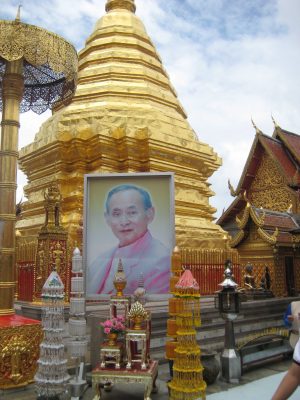A Thai court has issued a rare acquittal in a royal defamation case against an 80-year-old writer, a week after judges handed down the most severe prison term ever imposed for the crime of lese-majeste.
The Bangkok Criminal Court ruled that Bundit Aneeya had not violated the country’s strict lese-majeste law because the allegedly defamatory comments he made in 2015 had not specifically referred to royalty and had not used rude language.
The unexpected acquittal comes amid a rash of lese-majeste cases aimed at tamping down a youthful protest movement that has been accompanied by rare open criticism of the Thai monarchy and King Vajiralongkorn. In the past two months, the authorities have imposed royal defamation charges against at least 54 people, according to the legal aid group Thai Lawyers for Human Rights.
Thailand’s controversial lese-majeste law – often referred to as Article 112 – carries prison terms of up to 15 years for any comments critical of the monarchy or the royal family.
Bundit was prosecuted for saying at a seminar at Bangkok’s Thammasat University in 2015 that “human value and dignity of Thais must be higher than dust under someone’s feet.” The phrase “the dust under your feet” is often used by people to refer to themselves in the king’s presence, and is usually accompanied by their abject prostration at the monarch’s feet. (As an aside, ritual prostration was banned by the reforming King Chulalongkorn in the late nineteenth century, only to be revived by the Thai ruling establishment as a timeless “tradition” in the Cold War period.)
The seminar was organized by the New Democracy Movement, a group of pro-democracy activists which formed after the military coup of May 2014, and has helped lead the mass demonstrations that roiled Thailand’s major cities in the second half of last year.
Bundit, an autodidact writer and translator who has written and translated more than 30 books, is no stranger to charges of royal defamation. This is the third he has faced since the military coup of 2014, all of which have involved comments calling for democratic reforms.
According to the Asian Human Rights Commission, Bundit was convicted in one previous case, for which he received a suspended sentence, and acquitted in the other. In both cases, the court took into account his advanced age and the fact that he suffers from mental illness and other health issues.
The sentence comes amid a protest movement that has seen unprecedented public criticism of the Royal Palace and online mockery of King Vajiralongkorn, and calls for the power and wealth of the monarchy to be placed under democratic control. In its initial stages, the government shied away from using the lese-majeste law to pursue protest leaders, reportedly because the king told the government rein in the use of the law. But that changed in November, when the police began slapping lese-majeste charges on protest leaders and other dissenters, and processing a backlog of other cases that had fallen into dormancy.
One of these was the case against Anchan Preelert, 65, whom a Bangkok court sentenced to 43-and-a-half years prison for posting audio clips to Facebook and YouTube with comments deemed critical of the palace. The 29 counts initially added up to an astonishing 87-year sentence, but the term was halved after the defendant admitted her “guilt.”
Coming after such a severe sentence, it is hard to judge the significance of Bundit’s acquittal. Tyrell Haberkorn, a professor at the University of Wisconsin-Madison who studies Thai protest movements, said it was unusual for a lese-majeste case to be acquitted. “They are rarely, but sometimes, dismissed,” she noted on Twitter of Bundit’s case. “What makes it particularly significant is the 43.5 year sentence (down from 87 years) handed down to Anchan, a 65-year-old former civil servant last week, and the over 50 Article 112 cases filed against democracy activists recently.”
Since lese-majeste has historically been so politicized in its implementation, it is tempting to view the acquittal as having political significance. However, it is also conceivable that it was a concession to Bundit’s poor health, given that he is one of the few lese-majeste suspects to have been previously granted bail by a military court.
In any event, with at least 54 lese-majeste cases working their way through the system, the likelihood that the ruling establishment will permit open criticism of the monarchy – and the wide inequalities of wealth and power that it helps to sacralize — is small.

































